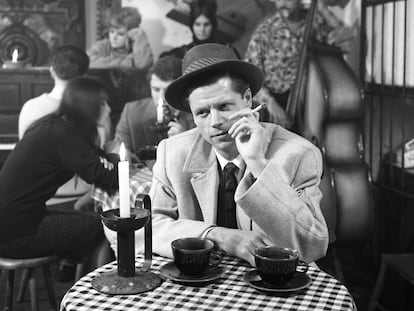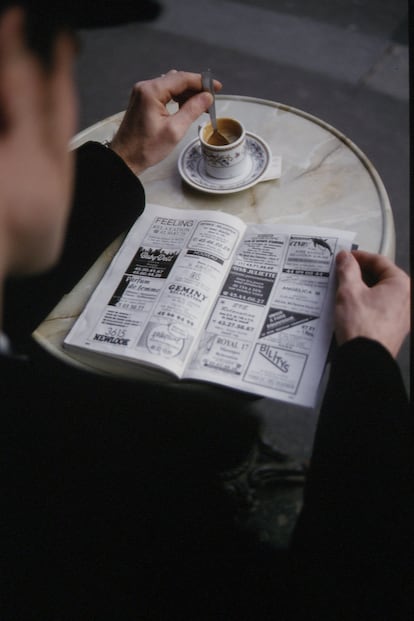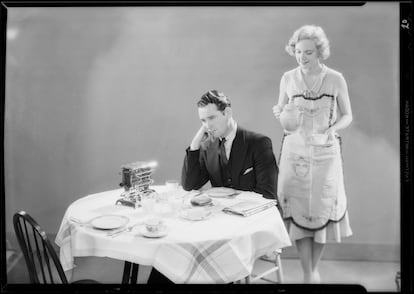Men, black coffee and virility: A myth perpetuated by advertising since the 1970s
While masculine Hollywood stars have been selling the benefits of espresso for decades on television, some studies speak of a correlation between caffeine consumption and male sexual potency


In a world where caffeine is the new oxygen, one cannot help but notice how those who advertise coffee are usually the most masculine, the most desired men in the pop universe. The latest to do so is David Beckham, who has taken over from George Clooney as the face of Nespresso. Although coffee was once seen as an eminently masculine drink, the moment it entered the domestic kitchen, it lost that testosterone-filled exclusivity that used to define it. However, as Julie Kjendal Reitz explains in her article A Shot of Masculinity, espresso (black, short, intense coffee) managed to keep its manhood intact: a shot of black coffee is — if we go by the cliché — a man’s thing.

“History has shown that the home is the female center of control. Men must journey outside of that domain for control. The ‘third place’ provides this control, the classic example being the tavern. The drinks that accompany this third place are inherently masculine. Also, if modern culture maintains that strong drinks are for strong bodies, the association between espresso and men applies. As a shot of liquor is concentrated alcohol, espresso is concentrated coffee and provides an accelerated caffeine ‘intoxication.’ While coffee evolved beyond its masculine origins, the espresso shot has retained its masculinity by virtually avoiding entrance into the home,” she writes. If we go over the most legendary coffee addicts, names such as Bach, Beethoven, Voltaire, Roosevelt or Kierkegaard pop up, as well contemporaries like David Lynch or Stieg Larsson (some say that his excessive consumption could have been one of the causes of the heart attack that killed him at a very young age). Women? Apparently, none of them drank coffee.
Coffee jerks
Already in the 1970s, Vincent Marotta, the creator of Mr. Coffee, made sure the beverage maintained its manly character by making Yankees legend Joe DiMaggio its ambassador, just in the same decade that middle-class women were beginning to enter the workforce. Fun fact: in the ad, the athlete was not in a kitchen, as it was considered too feminine.
A YouTube video that has garnered more than 1.4 million views compiles several scenes from coffee ads from the 1950s and 1960s in which a husband acts like a jerk, complaining that his wife’s coffee is bad. “Forget the coffee, Marge. It’s never very good,” a disillusioned man utters as he leaves for work. “I’ll get some at the plant.” Regrettably, this image was not exclusive to advertisements: American women (and men, if they ever tried) were incapable of making coffee that did not taste bitter, so the arrival of the drip coffee maker was celebrated by them, and helped in some way to get men into domestic work. Rebecca K. Shrum explains in Selling Mr. Coffee that the arrival of Mr. Coffee (male name, male ambassador) drove millions of Americans to replace electric percolators with drip-and-filter coffee makers, and associated men with an appliance for the first time.
Cut to today. Nowadays, it is men who boast of being caffeine lovers and knowledgeable experts on the subject. That is why not only Nespresso has trusted its product to the most emblematic movie stars; De’Longhi has Brad Pitt as brand ambassador, too. In fact, all he asked for in exchange for making a cameo in Deadpool 2 was a cup of coffee. “I was told all he wants is a cup of coffee and I said, ‘Like a franchise or just one individual cup of coffee?’ And I was told one individual cup of coffee, which was really his way of saying, ‘I’m doing it for nothing,’” Ryan Reynolds told Entertainment Tonight.
“We are talking about something that’s closely intertwined with gender: coffee is bitter, like men, who are also supposed to be manly and strong, while women are supposed to be sweet. Women are highly sexualized and can sell almost any product, but this doesn’t happen as much with men. If you look for a product that exalts the masculine, what could be better than combining a strong coffee with a handsome heartthrob? The intense flavor and strong aroma of coffee are positive adjectives that are associated with masculinity. If that stud is capable of making good coffee, he has even more qualities to be supposedly desirable for women,” explains psychologist and sexologist Mariona Gabarra. “In this case, the profiles they choose are of attractive, famous men who are also well liked, so they don’t cause anyone any insecurity. That way, men and women, everyone is happy,” says Mònica Escudero, journalist specialized in gastronomy, editor and coordinator at EL PAÍS.

Inequalities are also present in the matters of high caffeine. Sabine Parrish, an expert in the ethnographic study of coffee consumption habits in São Paulo, Brazil, explains that customers clearly feel more comfortable in a coffee shop where a man is operating the coffee maker. “It’s basically boys and cars all over again. Boys play with machines and are better at anything technological. This idea is very ingrained; we are socially programmed to know who we expect to be technologically competent… and it’s not the women.” By the way, in the 2023 World Barista Champion competition, the six finalists were men. In its 23-year history, only two women have won.
Coffee is sexy
Be that as it may, and as long as we don’t change things, coffee is manly. According to Lorelai Gilmore, from the series Gilmore Girls (where instead of wine and beer, coffee prevailed), it is sexy, too. “If it was physically possible to make love to a hot beverage, this would be the one,” she says as she takes a sip. “A good coffee is knowing how to appreciate pleasure, and that is always sexy. Being interested in how to enjoy it is giving importance to one of our closest pleasures,” says Borja Roselló Sala, owner of Dalton Coffee in Barcelona, Spain. “Improving your daily coffee is changing your life. A cup of coffee in your hand is the healthiest thing, and the ultimate legal pleasure,” he adds.
A study carried out by the University of Texas revealed that men who drink two or three cups of coffee a day have fewer problems with erectile dysfunction, as according to the data, men who consumed between 85 and 170 milligrams of caffeine a day in the analysis were 42% less likely to suffer from it. In other words: coffee (and the coffee ceremony) has not only been associated with a sexy, manly image, but also with properties that, according to the right study, make caffeine the new Viagra. That might not be exactly the case, but studies linking caffeine with sexual potency have been published in various media outlets. That is, perhaps, the final push that the image of the hot guy selling coffee needs. Although, judging by all the world-class hunks that have been advertising coffee since the 1970s, perhaps this was no secret to those in the know.
Sign up for our weekly newsletter to get more English-language news coverage from EL PAÍS USA Edition
Tu suscripción se está usando en otro dispositivo
¿Quieres añadir otro usuario a tu suscripción?
Si continúas leyendo en este dispositivo, no se podrá leer en el otro.
FlechaTu suscripción se está usando en otro dispositivo y solo puedes acceder a EL PAÍS desde un dispositivo a la vez.
Si quieres compartir tu cuenta, cambia tu suscripción a la modalidad Premium, así podrás añadir otro usuario. Cada uno accederá con su propia cuenta de email, lo que os permitirá personalizar vuestra experiencia en EL PAÍS.
¿Tienes una suscripción de empresa? Accede aquí para contratar más cuentas.
En el caso de no saber quién está usando tu cuenta, te recomendamos cambiar tu contraseña aquí.
Si decides continuar compartiendo tu cuenta, este mensaje se mostrará en tu dispositivo y en el de la otra persona que está usando tu cuenta de forma indefinida, afectando a tu experiencia de lectura. Puedes consultar aquí los términos y condiciones de la suscripción digital.








































